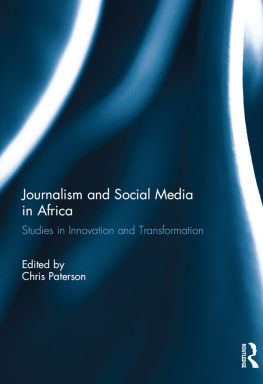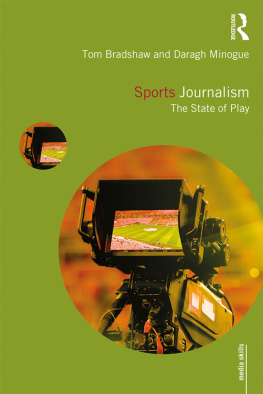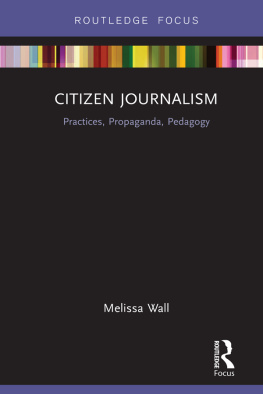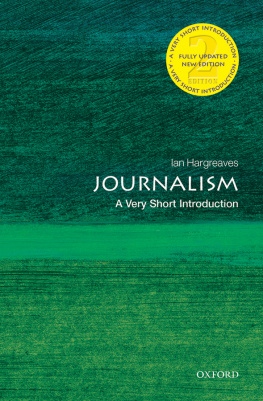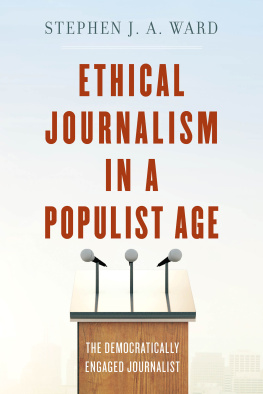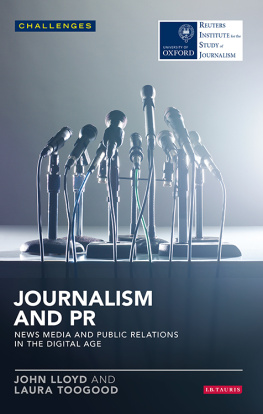
Reimagining Journalism and Social Order in
a Fragmented Media World
This book examines journalisms ability to promote and foster cohesive and collective action while critically examining its place in the intensifying battle to maintain a societys social order.
From chapters discussing the challenges journalists face in covering populism and Donald Trump, to chapters about issues of race in the news, intersections of journalism and nationalism, and increased mobilities of audiences and communicators in a digital age, Reimagining Journalism and Social Order in a Fragmented Media World focuses on the pitfalls and promises of journalism in moments of social contestation. Rich with perspectives from across the globe, this book connects journalism studies to critical scholarship on social order and social control, nationalism, social media, geography and the function of news as a social sphere.
In a fragmented media world and in times of social contestation, Reimagining Journalism and Social Order in a Fragmented Media World provides readers with insights as to how journalism operates in order to highlightand enhanceelements and actions that bring about order. This book was originally published as a special issue of Journalism Studies and a special issue of Journalism Practice.
Robert E. Gutsche, Jr. is Senior Lecturer in Critical Digital Media Practice at Lancaster University, UK. His research focuses on issues of intersections of journalism, geography and power, and appears in Journalism Studies, Journalism Practice, and Journalism and Mass Communication Quarterly. He is editor of The Trump Presidency, Journalism, and Democracy (Routledge, 2018).
Kristy Hess is Associate Professor in Communication at Deakin University, Australia. She studies journalism and its relationship to social connection and place- making, often through a lens of media power. Her work appears in leading international journalism and media journals, she is the author of two monographs and she is the Associate Editor of Digital Journalism.
Reimagining Journalism and
Social Order in a Fragmented
Media World
Edited by
Robert E. Gutsche, Jr. and Kristy Hess
First published 2020
by Routledge
2 Park Square, Milton Park, Abingdon, Oxon, OX14 4RN
and by Routledge
52 Vanderbilt Avenue, New York, NY 10017
Routledge is an imprint of the Taylor & Francis Group, an informa business
2020 Taylor & Francis
All rights reserved. No part of this book may be reprinted or reproduced or utilised n any form or by any electronic, mechanical, or other means, now known or hereafter invented, including photocopying and recording, or in any information storage or retrieval system, without permission in writing from the publishers.
Trademark notice: Product or corporate names may be trademarks or registered trademarks, and are used only for identification and explanation without intent to infringe.
British Library Cataloguing in Publication Data
A catalogue record for this book is available from the British Library
ISBN13:978-0-367-36605-6
Typeset in Myriad Pro
by Newgen Publishing UK
Publishers Note
The publisher accepts responsibility for any inconsistencies that may have arisen during the conversion of this book from journal articles to book chapters, namely the inclusion of journal terminology.
Disclaimer
Every effort has been made to contact copyright holders for their permission to reprint material in this book. The publishers would be grateful to hear from any copyright holder who is not here acknowledged and will undertake to rectify any errors or omissions in future editions of this book.
Contents
Robert E. Gutsche Jr. and Kristy Hess
Kristy Hess and Robert E. Gutsche Jr.
Brian McNair
Michael McDevitt and Patrick Ferrucci
Paul C. Adams
Brian Michael Goss
Nikki Usher
Henrik Bdker and Teke Ngomba
Curd Benjamin Knpfer
Lanier Frush Holt
Sushmita Pandit and Saayan Chattopadhyay
Svetlana S. Bodrunova, Anna A. Litvinenko, and Ivan S. Blekanov
Jacob L. Nelson
Tanya Muscat
Alice Baroni and Andrea Mayr
The following chapters were originally published in Journalism Studies, volume 19, issue 4 (2018). When citing this material, please use the original page numbering for each article, as follows:
Introduction
Contesting Communities: The problem of journalism and social order
Robert E. Gutsche Jr. and Kristy Hess
Journalism Studies, volume 19, issue 4 (2018), pp. 473482
Chapter 1
Journalism and the Social Sphere: Reclaiming a foundational concept for beyond politics and the public sphere
Kristy Hess and Robert E. Gutsche Jr.
Journalism Studies, volume 19, issue 4 (2018), pp. 483498
Chapter 2
From Control to Chaos, and Back Again: Journalism and the politics of populist authoritarianism
Brian McNair
Journalism Studies, volume 19, issue 4 (2018), pp. 499511
Chapter 3
Populism, Journalism, and the Limits of Reflexivity: The case of Donald J. Trump
Michael McDevitt and Patrick Ferrucci
Journalism Studies, volume 19, issue 4 (2018), pp. 512526
Chapter 4
Migration Maps with the News: Guidelines for ethical visualization of mobile populations
Paul C. Adams
Journalism Studies, volume 19, issue 4 (2018), pp. 527547
Chapter 5
Veritable Flak Mill: A case study of Project Veritas and a call for truth
Brian Michael Goss
Journalism Studies, volume 19, issue 4 (2018), pp. 548563
Chapter 6
Re-Thinking Trust in the News: A material approach through Objects of Journalism
Nikki Usher
Journalism Studies, volume 19, issue 4 (2018), pp. 564578
Chapter 7
Community Repair through Truce and Contestation: Danish legacy print media and the Copenhagen shootings
Henrik Bdker and Teke Ngomba
Journalism Studies, volume 19, issue 4 (2018), pp. 579593
Chapter 8
Diverging Projections of Reality: Amplified frame competition via distinct modes of journalistic production
Curd Benjamin Knpfer
Journalism Studies, volume 19, issue 4 (2018), pp. 594611
The following chapters were originally published in Journalism Practice, volume 12, issue 2 (2018). When citing this material, please use the original page numbering for each article, as follows:
Chapter 9
Using the Elaboration Likelihood Model to Explain to Whom #Black Lives Matter and to Whom it Does not
Lanier Frush Holt
Journalism Practice


